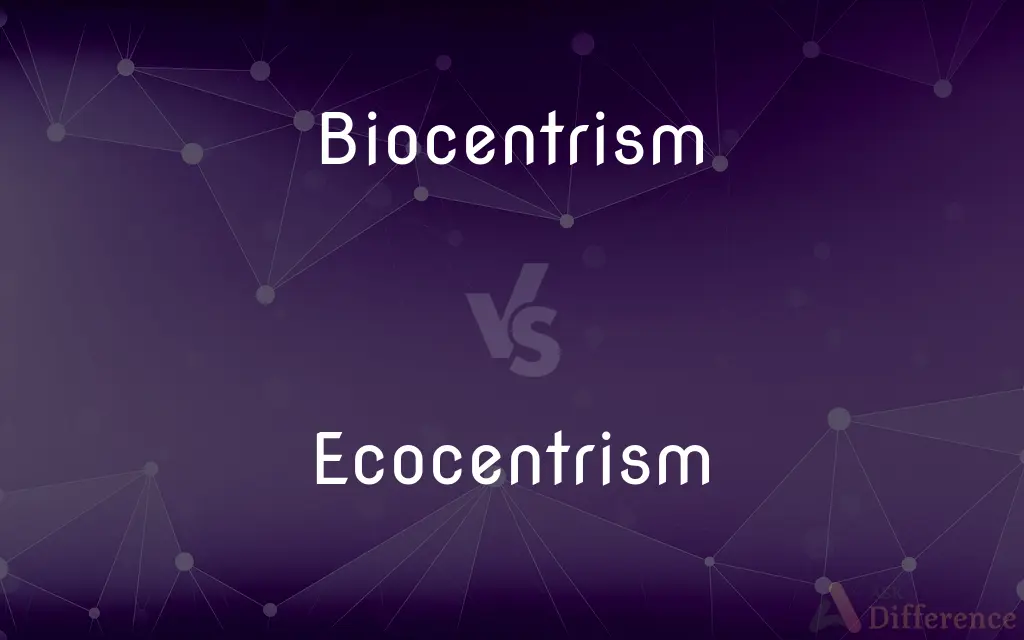Biocentrism vs. Ecocentrism — What's the Difference?
By Tayyaba Rehman & Fiza Rafique — Published on February 10, 2024
Biocentrism focuses on all life forms' intrinsic value, while Ecocentrism values ecosystems as wholes, including abiotic elements.

Difference Between Biocentrism and Ecocentrism
Table of Contents
ADVERTISEMENT
Key Differences
Biocentrism is an ethical perspective that emphasizes the intrinsic value of all living beings, not just humans. It argues that every organism has a right to exist and that humanity should respect the interests of all living beings. Biocentrism challenges anthropocentric views, suggesting that our ethical considerations should extend to the entire biosphere. Ecocentrism broadens this perspective further, incorporating not only living beings but also the non-living components of ecosystems into its value system. It posits that the well-being of an entire ecosystem should be the focus of ethical concern, not just individual organisms within it.
Biocentrism often leads to arguments for the protection of individual species based on their inherent value, regardless of their utility to humans. This view can influence conservation strategies that prioritize the protection of endangered species and biodiversity. Ecocentrism, on the other hand, might support actions that benefit the whole ecosystem, even if they are at the expense of certain species. This holistic approach values the interactions and processes within ecosystems, emphasizing the importance of maintaining functional, balanced ecosystems.
The philosophical underpinnings of Biocentrism suggest a deep respect for life, advocating for a reevaluation of humanity's place in the natural world. It calls for a shift in human behavior towards more sustainable practices that acknowledge the rights of all living beings. Ecocentrism extends this respect to the land, water, and air, advocating for a sustainability that encompasses the entire planet's health. This approach recognizes the complex interdependencies within ecosystems, including the significance of non-living elements such as rivers, mountains, and climate.
In practice, Biocentrism might influence policies and practices that focus on animal rights, plant conservation, and the cessation of practices harmful to individual species. Ecocentrism would influence broader environmental policies, including land use, water management, and climate change mitigation efforts, to preserve the integrity and functionality of whole ecosystems. Both perspectives offer valuable insights into environmental ethics, but they differ in their scope and the emphasis they place on different components of the natural world.
Both Biocentrism and Ecocentrism contribute significantly to environmental ethics and conservation efforts. Biocentrism's focus on individual life forms and their rights complements Ecocentrism's broader view of ecosystems as integral entities. Together, they provide a comprehensive framework for understanding and addressing environmental issues, advocating for a shift from human-centered to nature-centered ethics.
ADVERTISEMENT
Comparison Chart
Focus
Intrinsic value of all living beings.
Value of ecosystems as wholes, including both biotic and abiotic elements.
Ethical Consideration
Individual organisms' rights and well-being.
Health and functionality of the entire ecosystem.
Conservation Approach
Protect individual species based on inherent value.
Maintain balance and integrity of whole ecosystems.
Philosophical Perspective
Life-centered, challenges anthropocentrism.
Ecosystem-centered, includes non-living elements.
Policy Influence
Animal rights, plant conservation, anti-harmful practices towards species.
Land use, water management, climate change mitigation for ecosystem preservation.
Compare with Definitions
Biocentrism
Biocentrism is the ethical viewpoint that all living beings have inherent value.
Biocentrism leads us to consider the impact of our actions on the smallest insects.
Ecocentrism
Emphasizes the interconnectedness of all living and non-living elements within an ecosystem.
Ecocentrism teaches us to see the storm not as an inconvenience, but as a vital part of the ecological cycle.
Biocentrism
Biocentrism advocates for the rights and well-being of individual organisms.
Biocentrism supports legislation that protects endangered species from extinction.
Ecocentrism
Views nature's intrinsic value as paramount, beyond human interests.
His ecocentrism led him to oppose the dam project, which would disrupt the river's natural flow.
Biocentrism
Biocentrism influences conservation strategies to prioritize biodiversity and species protection.
Biocentrism drives efforts to create reserves for species with no direct benefit to humans.
Ecocentrism
Advocates for the holistic management of natural resources, considering all ecosystem components.
The forest management plan, influenced by ecocentrism, emphasizes biodiversity preservation.
Biocentrism
Biocentrism places the interests of all life forms at the center of ethical decision-making.
From a biocentric perspective, deforestation is unacceptable due to its impact on forest dwellers.
Ecocentrism
A philosophy that regards ecosystems as central to ethical considerations.
The new wildlife protection law reflects an ecocentrism approach, prioritizing habitat conservation over development.
Biocentrism
Biocentrism challenges human superiority and promotes equality among all living beings.
Biocentrism questions practices that prioritize human convenience over animal habitats.
Ecocentrism
Prioritizes the well-being of entire ecosystems over individual species or human needs.
From an ecocentrism perspective, protecting the wetlands is essential for maintaining ecological balance.
Biocentrism
An ethical viewpoint that extends inherent value to all non-human life, regardless of its sentience.
Ecocentrism
(political philosophy) A nature-centred, as opposed to human-centred, value system.
Biocentrism
A cosmological theory viewing life and biology as central to being, reality, and the cosmos such that life creates the universe rather than the other way around.
Common Curiosities
What is ecocentrism?
Ecocentrism is an environmental philosophy that places ecosystems and their health at the center of ethical and decision-making processes.
Can ecocentrism be applied to urban planning?
Yes, ecocentrism can guide urban planning by integrating green spaces, biodiversity, and sustainable practices to support ecosystem health.
What is a practical example of biocentrism?
A practical example of biocentrism is creating wildlife corridors to allow animals to move freely and safely across human-dominated landscapes.
How can individuals practice ecocentrism in their daily lives?
Individuals can practice ecocentrism by reducing their environmental footprint, supporting conservation efforts, and advocating for policies that protect ecosystems.
How does ecocentrism influence environmental policy?
Ecocentrism influences environmental policy by advocating for laws and regulations that protect and preserve entire ecosystems rather than focusing solely on human benefits.
How does ecocentrism contribute to biodiversity conservation?
Ecocentrism contributes to biodiversity conservation by emphasizing the importance of maintaining the integrity and health of ecosystems, which support diverse life forms.
How do biocentrism and ecocentrism address climate change?
Both philosophies advocate for actions to mitigate climate change, with biocentrism focusing on the impact on living beings and ecocentrism on the overall ecosystem health.
How does biocentrism differ from ecocentrism?
Biocentrism focuses on all living things' intrinsic value, while ecocentrism extends this value to entire ecosystems, including non-living elements.
What ethical considerations are central to biocentrism?
Ethical considerations in biocentrism include the moral obligation to respect the intrinsic value of all living beings and to consider their interests in human decision-making.
What role do humans play in an ecocentric worldview?
In an ecocentric worldview, humans are seen as part of the ecosystem, with responsibilities to maintain its health and balance rather than dominate it.
What challenges do ecocentrism face in modern society?
Ecocentrism faces challenges such as economic growth priorities, consumerism, and lack of awareness about the interconnectedness of ecosystems.
Is biocentrism against technological development?
Biocentrism is not inherently against technological development but emphasizes that such development should not harm living beings and should respect their intrinsic value.
What is the ultimate goal of ecocentrism in environmental conservation?
The ultimate goal of ecocentrism is to create a sustainable coexistence where ecosystems are preserved and restored, ensuring the well-being of all earth's inhabitants, including humans.
Can biocentrism and ecocentrism coexist in environmental philosophy?
Yes, biocentrism and ecocentrism can coexist and complement each other in environmental philosophy by emphasizing the value of life and ecosystems respectively.
How can education promote biocentric and ecocentric values?
Education can promote these values by teaching about the intrinsic worth of all life and ecosystems, ecological principles, and the impact of human actions on the environment.
Share Your Discovery

Previous Comparison
Yogurt vs. Sour Cream
Next Comparison
Blu-Ray vs. HD DVDAuthor Spotlight
Written by
Tayyaba RehmanTayyaba Rehman is a distinguished writer, currently serving as a primary contributor to askdifference.com. As a researcher in semantics and etymology, Tayyaba's passion for the complexity of languages and their distinctions has found a perfect home on the platform. Tayyaba delves into the intricacies of language, distinguishing between commonly confused words and phrases, thereby providing clarity for readers worldwide.
Co-written by
Fiza RafiqueFiza Rafique is a skilled content writer at AskDifference.com, where she meticulously refines and enhances written pieces. Drawing from her vast editorial expertise, Fiza ensures clarity, accuracy, and precision in every article. Passionate about language, she continually seeks to elevate the quality of content for readers worldwide.
















































